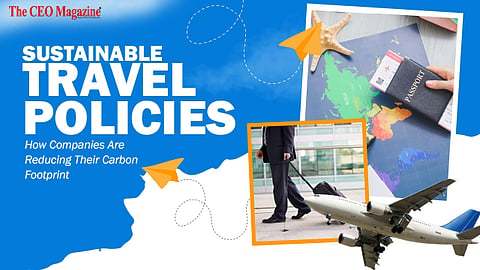
- News
- Women
- Magazine
- IndustryIndustry
- InsightsInsights
- Success Stories
- PublishPublish
- ContactContact
- Media KitMedia Kit

Sustainable Travel Policies: How Companies Are Reducing Their Carbon Footprint
In an era where climate change and environmental sustainability are at the forefront of global concerns, companies are increasingly recognising the importance of reducing their carbon footprint. One significant area where businesses are making strides is in implementing sustainable travel policies. These policies not only address environmental impact but also align with corporate social responsibility (CSR) goals, enhancing brand reputation and employee satisfaction. This article delves into the strategies companies are employing to promote sustainable travel and reduce their carbon emissions.
Business travel has long been a staple of corporate operations, facilitating meetings, conferences, and networking opportunities. However, it also contributes significantly to carbon emissions, primarily through air travel, hotel stays, and transportation. As the urgency to combat climate change intensifies, companies are re-evaluating their travel practices to align with sustainability goals. Sustainable travel policies are essential for reducing the environmental impact of corporate activities, fostering a culture of environmental stewardship, and meeting the growing expectations of stakeholders.
One of the most effective ways to reduce business travel is by leveraging technology for virtual meetings. Platforms like Zoom, Microsoft Teams, and Google Meet have revolutionised how businesses communicate, enabling face-to-face interactions without the need for physical travel. By prioritising virtual meetings over in-person ones, companies can significantly cut down on travel-related carbon emissions. This approach not only supports sustainability but also saves time and costs associated with travel.
To minimise unnecessary travel, many companies have introduced stringent travel approval processes. These procedures require employees to justify the necessity of their travel, considering alternatives such as virtual meetings or local substitutes. By scrutinising travel requests, companies can ensure that only essential trips are undertaken, thereby reducing their overall carbon footprint. Additionally, travel approval systems can incorporate sustainability criteria, encouraging employees to choose eco-friendly options when travel is unavoidable.
When travel is necessary, companies are encouraging the use of eco-friendly transportation options. This includes opting for trains over flights for short to medium distances, as rail travel typically generates lower carbon emissions. For local transportation, companies are promoting the use of public transit, carpooling, and ridesharing services. Furthermore, some companies are investing in electric or hybrid company vehicles and providing incentives for employees who choose green transportation methods.
Companies are also forming partnerships with airlines, hotels, and travel agencies that prioritise sustainability. Many airlines are now offering carbon offset programs, allowing passengers to compensate for their travel emissions by funding environmental projects. Similarly, eco-friendly hotels are implementing practices such as energy-efficient lighting, water conservation, and waste reduction. By selecting travel providers committed to sustainability, companies can ensure that their travel-related activities align with their environmental goals.
Sustainable accommodations are becoming a priority for companies looking to reduce their carbon footprint. This involves choosing hotels that have earned certifications for their environmental practices, such as LEED (Leadership in Energy and Environmental Design) or Green Key. These certifications indicate that the hotel adheres to stringent sustainability standards, including energy efficiency, waste reduction, and responsible sourcing. Additionally, companies can encourage employees to engage in eco-friendly practices during their stay, such as reusing towels and reducing energy consumption.
Carbon offsetting is an increasingly popular strategy for mitigating the environmental impact of business travel. Companies can calculate the carbon emissions generated by their travel activities and invest in projects that offset these emissions. Examples of such projects include reforestation, renewable energy development, and methane capture. By participating in carbon offset programs, companies can neutralise their travel-related carbon footprint and contribute to global sustainability efforts.
Creating a culture of sustainability within an organisation requires educating employees about the importance of sustainable travel practices. Companies can provide training sessions, workshops, and resources that highlight the environmental impact of travel and the steps employees can take to minimise it. By raising awareness and encouraging responsible travel behaviour, companies can empower their workforce to make environmentally conscious decisions.
Several companies are setting exemplary standards in sustainable travel practices:
Microsoft has a strong commitment to sustainability, aiming to become carbon-negative by 2030. They focus on reducing emissions across their entire value chain, including business travel. Microsoft encourages the use of virtual meetings and has implemented measures to offset carbon emissions from necessary travel.
Google has also committed to ambitious sustainability goals, including operating on carbon-free energy by 2030. They emphasise reducing carbon emissions from their operations and supply chain, including travel. Google promotes virtual collaboration tools and has programs to offset travel-related emissions.
Deloitte has various sustainability initiatives and aims to reduce its environmental impact. They encourage virtual meetings and have policies to minimise unnecessary travel. Deloitte partners with organisations to offset emissions from travel and promotes the use of eco-friendly transportation options.
As the world grapples with the challenges of climate change, companies have a pivotal role to play in reducing their carbon footprint. Sustainable travel policies are a crucial component of corporate sustainability strategies, enabling businesses to minimise their environmental impact while maintaining operational efficiency. By embracing virtual meetings, implementing travel approval processes, promoting eco-friendly transportation, and partnering with sustainable travel providers, companies can significantly reduce their travel-related carbon emissions. Moreover, educating employees and participating in carbon offset programs further enhance these efforts. As more companies adopt these practices, the collective impact on global sustainability will be profound, paving the way for a greener future.
Follow us on Google News
